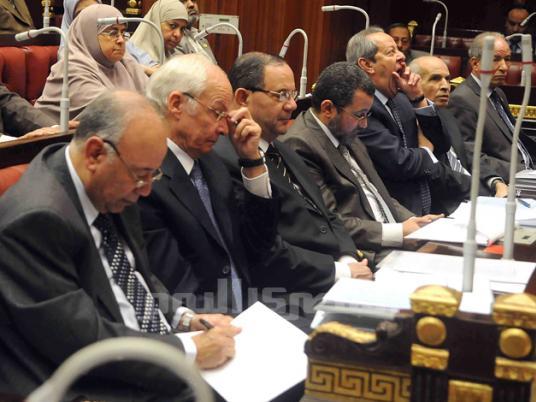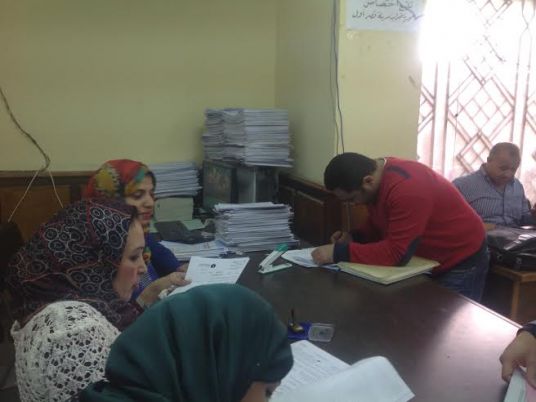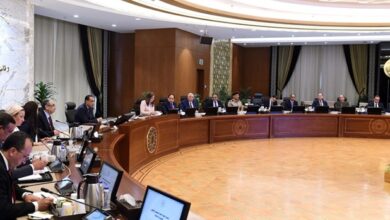
Discrepancies continue to a greater extent between state-owned and independent news coverage in Tuesday’s papers. While state-run papers praise the so-called “achievements” of the government, privately-owned papers highlight the deteriorating economic and social conditions in Egypt, as well as the growing rifts between political parties.
The front-page picture in state flagship paper Al-Ahram shows Prime Minister Hesham Qandil in a surprise tour of river buses to ensure the safety of those on board is monitored.
The paper continues to lavishly advertise the Qandil Cabinet’s latest statements in its top headlines: “600,000 comprehensive health insurance cards are provided for breadwinner women at LE1 per month” and “Allocating a budget of LE4 billion for the development of slum areas throughout Egypt within 10 years.”
Following in Al-Ahram’s footsteps, state-run paper Al-Akhbar quotes Petroleum Minister Osama Kamal on its front page as saying that Egypt would witness a good return on investments in the Western Desert, reaching US$1.2 billion this year.
On the other hand, Independent daily Al-Watan features an extensive report on the depth of the current economic recession and its aggregate, damaging impacts on the country’s different sectors, including industry, tourism, agriculture, stock market, and real estate.
The report gives readers a reality check by providing substantial figures related to GDP and the budget deficient during 2012, in addition to heartbreaking stories recounted by dozens of people living below the national poverty line.
The hot, debatable issue of the upcoming parliamentary elections also makes headlines in Tuesday’s independent papers.
Privately-owned daily Youm7 writes that the Freedom and Justice party, the Muslim Brotherhood’s political arm, is considering fielding 70 percent of its former parliamentarians in the dissolved People’s Assembly on its ballot list for the upcoming polls, as well as running 30 percent of its candidates from among women and youth in different constituencies.
The report adds that the FJP is not intending to engage in electoral alliance with other Islamist movements. However, later media reports have indicated that the FJP will, in fact, seek an electoral alliance with Hazem Salah Abu Ismail's Umma Party and Emad Abdel Ghafour's Al-Watan Party.
Independent paper Al-Tahrir reports on the rift that has opened up within the National Salvation Front between its youth committee members and the Wafd Party.
It is reported that Wafd Party head Al-Sayed al-Badawi called for an emergency meeting with its senior members to discuss how to respond on recent, repeated statements issued by the Front’s youth committee refusing to allow Wafd Party members to run on the same electoral list.
Both Youm7 and Al-Tahrir cover a news piece from the British Daily Telegraph newspaper on “the mass migration of Copts from Egypt.”
The report says that 100,000 Christians fled the country after the outbreak of the 25 January revolution due to the Islamists’ ascent to power.
The British paper quotes one of the Egyptian priests as saying that Copts were migrating to the US, Canada and Australia as a result of suffering deliberate marginalization in their own homeland and facing religious discrimination, particularly unveiled Christian women.
Speaking to Youm7, Safwat al-Bayadi, representative of the Coptic Evangelical Church, takes an opposing view, asserting that the paper makes exaggerated claims. He counters the report by claiming that 60 out of every 100 people who have left the country are Muslims, not Christians.
The FJP’s daily publication, Freedom and Justice, writes that despite the Shura Council Legislative Committee’s approval of an electronic voting system for the next presidential elections, the government has refused the system, saying that it requires more study.
According to a senior official in the Justice Ministry, electronic voting reportedly needs extensive preparation to ensure the voting system is transparent and not vulnerable to hackers.
Egypt’s papers:
Al-Ahram: Daily, state-run, largest distribution in Egypt
Al-Akhbar: Daily, state-run, second to Al-Ahram in institutional size
Al-Gomhurriya: Daily, state-run
Rose al-Youssef: Daily, state-run
Al-Dostour: Daily, privately owned
Al-Shorouk: Daily, privately owned
Al-Watan: Daily, privately owned
Al-Wafd: Daily, published by the liberal Wafd Party
Youm7: Daily, privately owned
Al-Tahrir: Daily, privately owned
Al-Sabah: Daily, privately owned
Freedom and Justice: Daily, published by the Muslim Brotherhood's Freedom and Justice Party
Sawt al-Umma: Weekly, privately owned
Al-Arabi: Weekly, published by the Nasserist Party
Al-Nour: Official paper of the Salafi Nour Party




